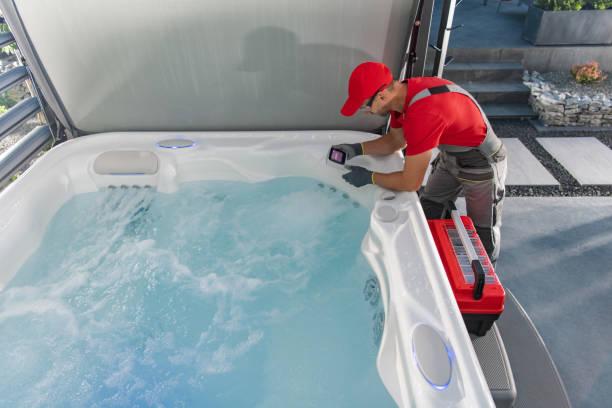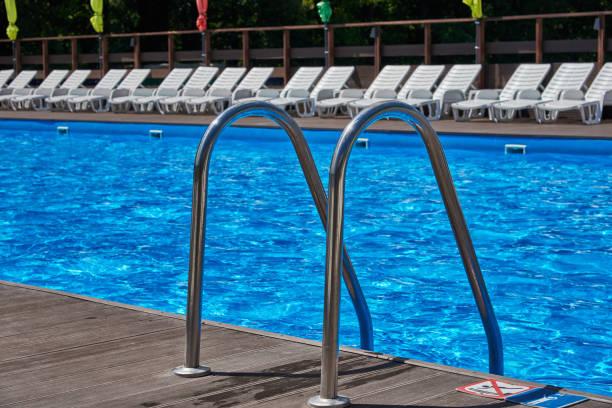Your backyard pool provides endless fun and a refreshing escape from the summer heat. But what happens when a leak springs, the pump sputters, or the filter clogs? Pool repairs can be daunting, and the cost can quickly escalate. However, before you panic, there are several cost-effective solutions you can explore to get your pool back in tip-top shape without breaking the bank.
The Importance of DIY Maintenance
While some repairs require professional expertise, maintaining a proactive approach to pool care can prevent minor issues from escalating into expensive problems. Here are some DIY maintenance tips to keep your pool running smoothly:
- Regular Cleaning: Skimming debris, brushing the walls and floor, and vacuuming regularly can prevent clogs, keep your filter functioning efficiently, and minimize algae growth, which can damage surfaces and require additional treatment.
- Proper Chemical Balance: Maintaining a balanced pool chemistry is crucial for preventing problems like corrosion, scaling, and cloudy water. Testing your pool water regularly and adjusting chlorine, pH, and other chemicals as needed can save you money down the line.
- Seasonal Maintenance: Winterizing your pool properly before cold weather sets in and opening it up for the season with a thorough cleaning can prevent damage from freezing temperatures and ensure the system functions optimally when you need it most.
Troubleshooting Common Issues
Many pool problems have simple solutions you can tackle yourself. Here are some common issues and their cost-effective fixes:
- Clogged Filter: A clogged filter can restrict water flow and reduce circulation. Clean the filter cartridge or grid regularly according to the manufacturer’s instructions. This is a simple task that can save you the cost of calling a professional.
- Low Water Level: A low water level can expose your pool equipment to the sun, leading to overheating and damage. Top up the water level to the recommended point.
- Tripped Circuit Breaker: A tripped breaker might indicate an overload on your pool’s electrical circuit. Check your pool pump and other equipment for any issues and reset the breaker. If the problem persists, consult a qualified electrician.
DIY Repairs for the Handy
If you’re comfortable with basic tools and have some DIY know-how, you can attempt certain repairs yourself. Here are a few examples:
- Replacing Gaskets: Leaking gaskets around pool equipment like filters and pumps can be easily replaced with readily available parts.
- Tightening Loose Connections: Loose pipes or hose connections can cause leaks. Identify the source of the leak and tighten the connection using pipe wrenches or screwdrivers.
- Fixing a Leaking Skimmer: A leaky skimmer can waste water and affect pool chemistry. Check for cracked parts or worn-out gaskets and replace them as needed.
When to Call a Professional
Some pool repairs are best left to the experts. Here are signs it’s time to call a professional for swimming pool repair near you:
- Complex Leaks: If you suspect a major leak in the pool structure or plumbing system, professional expertise and specialized equipment are necessary for diagnosis and repair.
- Electrical Issues: Any electrical problems with your pool equipment can be dangerous and should be handled by a qualified electrician.
- Equipment Failure: Replacing major pool equipment like pumps or filters usually requires professional installation to ensure proper function and avoid future problems.
- Extensive Damage: Structural damage to your pool walls, liner, or deck requires professional evaluation and repair to maintain the pool’s integrity and aesthetics.

Finding Reputable Pool Repair Services
When professional repairs are necessary, finding a reliable and trustworthy company is key. Here are some tips to find the best pool repair services in your area:
- Get Recommendations: Ask friends, family, and neighbors for recommendations on reputable pool service companies they’ve used.
- Research Online Reviews: Read online reviews on platforms like Google My Business and Yelp to gauge customer satisfaction and experience with different companies.
- Compare Quotes: Get quotes from multiple companies to compare pricing and services offered. Don’t just go for the cheapest option; consider the company’s experience, qualifications, and warranties.
- Check Insurance and Licensing: Ensure the company has liability insurance and any necessary licenses required for pool repairs in your area.
Partnering with Pool Service Companies
While DIY maintenance and simple repairs can save you money, consider partnering with a reputable McKinney pool service company for comprehensive pool care. This offers several benefits:
- Preventative Maintenance: Many companies offer preventative maintenance plans that include regular cleaning, equipment inspections, and minor repairs. This can help identify potential problems early on before they become major issues.
- Expert Knowledge and Skills: Professional pool service technicians have the knowledge, training, and experience to handle complex repairs efficiently.
